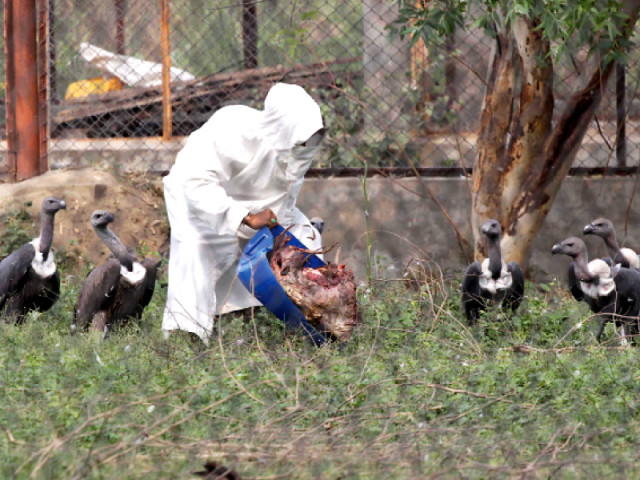Endangered species: WWF lobbies for drug ban
Gyps vulture population down 90% since 1990s.

Gyps vulture are now classified by IUCN Bird Life International 2004 as critically endangered. PHOTO: SHAFIQ MALIK/ EXPRESS
World Wide Fund Pakistan (WWF-Pakistan) on Wednesday organised a field visit for journalists to its ex-situ conservation facility at Changa Manga where they were briefed about the Gyps Vulture Restoration Project.
The journalists rode a train for the visit. They were later taken to the Gyps Vulture Restoration Facility where they were shown the feeding system and their behaviour in captivity.
They were also briefed by WWF-Pakistan Primary Vulture Supervisor Faisal Farid.
He highlighted the ecological importance of vultures and reasons for their rapid decline.
He said captive breeding was an important conservation method to save a species.
He said the organisation was also lobbying for a diclofenac-free environment.
He said the Gyps vulture species had declined by more than 90 per cent in Pakistan, India and Nepal since the early 1990s. He said the bird was now classified by IUCN Bird Life International 2004 as critically endangered.
He said diclofenac sodium, a non-steroidal anti-inflammatory drug (NSAID), used in livestock, was the main cause of mortality in species. He said it resulted in kidney failure in vultures.
He said in 2005, WWF-Pakistan had launched a captive breeding programme at Changa Manga forest aiming to secure a viable population of the white-backed vulture (Gyps bengalensis).
He said there were 15 white-backed vultures at the facility.
He said the organisation had lobbied with the government to implement a ban on the sale and manufacture of diclofenac sodium in September 2006.
He said the Gyps Vulture Restoration Facility was the only ex-situ project in Pakistan dedicated to fighting threats faced by white-backed vultures.
He said WWF-Pakistan had been working on in-situ conservation of the white-backed vulture in Nagar Parkar, Sindh since January 2012.
He said Gyps vultures and long-billed vulture populations were restricted to the Karoonjhar hills and its adjacent villages in Nagar Parkar.
Published in The Express Tribune, October 10th, 2013.



















COMMENTS
Comments are moderated and generally will be posted if they are on-topic and not abusive.
For more information, please see our Comments FAQ